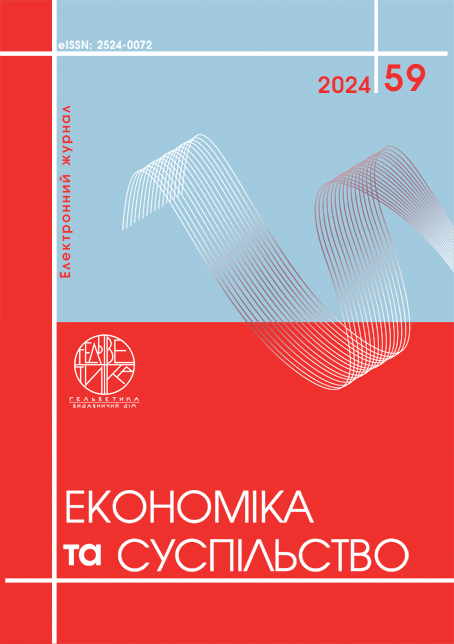CREATIVE SOLUTIONS IN THE PERSONNEL MANAGEMENT SYSTEM DURING WAR: CHALLENGES AND PROSPECTS
Abstract
In war conditions, personnel management becomes a particularly complex task that requires new approaches and innovative solutions. Challenges include loss of personnel, psychological stress and instability, requiring the study and development of effective management strategies. The purpose of the study is to characterize the features of creative decision-making in the personnel management system in war conditions. Military actions force personnel to reconsider their preferences, in particular: important moments of peaceful life turned out to be meaningless during the war; complete disorientation caused by the uncertainty of the future; change in the emotional state of the team; irritability and helplessness; individual workers take positions and change identities (leaders become confused and paralyzed, while the calm, quiet worker demonstrates the pinnacle of productivity and social maturity). It has been proven that the relevance of making creative decisions in the personnel management system for enterprises can be justified on several aspects, especially in a constantly changing environment. The main determinants of creativity that influence the enterprise personnel management system are identified. It has been determined that creative solutions in the field of personnel management in war conditions are not simply an adaptation to change, they are aimed at actively creating an environment in which both the business and its employees can survive and ultimately thrive, despite the problems caused by war . The features of the influence of war on the personnel management system of a modern enterprise are characterized. Creative solutions in the personnel management system themselves allow the development of a corporate culture of innovation. When employees see that the management team is open to new ideas and willing to experiment, it encourages them to be creative in their own work. This creates a positive environment for innovation at all levels of the organization. By themselves, creative solutions in the personnel management system enable the development of a corporate culture of innovation.
References
Gladka, O., & Fedorova, V. (2019) Defining personnel marketing strategies. Business: Theory and Practice, 20, 146–157.
Lievens F, Highhouse S (2003) The relation of instrumental and symbolic attributes to a company’s attractiveness as an em-ployer. Personnel Psychology 56: 75–102.
Stankevičienė, A., Liučvaitienė, A., & Volungevičienė, D. (2008) The possibilities of personnel development principle adaptability in personnel training. Business: Theory and Practice, 9(3), 199–209.
Stasytyte, V., Aleksienė, L. (2015) Operational risk assessment and management in small and medium-sized enterprises. Business: Theory and Practice, 16(2): 140–148.
Kopytko, M., Liubokhynets, L., Kalinin, A., Sai, L., Bala, O. (2023) Personnel management in the system of ensuring safety and security of the engineering enterprise in the conditions of industry 4.0. International Journal of Safety and Security Engineering, Vol. 13, No. 3, pp. 547–554.
Nikonenko, U., Maksymenko, D., Holovachko, V., Golubka, Y., Guk, O. (2023) Accounting and auditing time management: A model for enterprise sustainable development planning. International Journal of Sustainable Development and Planning, Vol. 18, No. 9, pp. 2883–288.
Chlivickas, E., Papšienė, P., Papšys, A. (2010) Human resources: Strategic management aspects. Business, Management and Economics Engineering, 8(1): 51–65.
Zhovnirchyk, Y., Cherkaska, V., Inozemtseva, O., Zhuravel, S., Pyzyuk, D. (2023) A planning model for improving personnel competence in pursuit of sustainable development. International Journal of Sustainable Development and Planning, Vol. 18, No. 9, pp. 2959–2965.
Kopytko, O., Lagodiienko, V., Falovych, V., Tchon, L., Dovhun, O., Litvynenko, M. (2019) Marketing communications as a factor of sustainable development. International Journal of Engineering and Advanced Technology, 8(6): 3305–3309.
Lobanova, L. (2009) Human resources management value in knowledge-based society. Business: Theory and Practice, 10(3), 233–246.
Podra O., Kurii L., Alkema V., Levkiv H., Dorosh O. (2020) Theoretical aspects of human capital formation through human potential migration redistribution and investment process. Business: Theory and Practice, 21(1). pp. 71–82.


